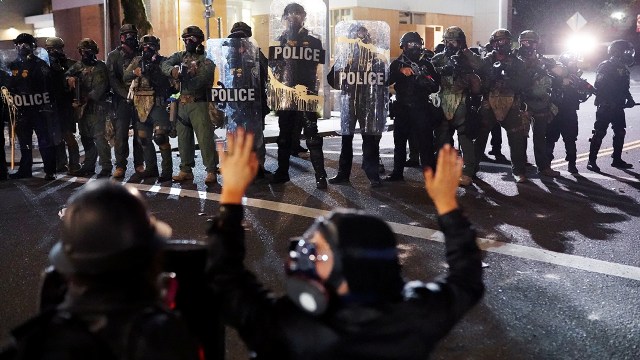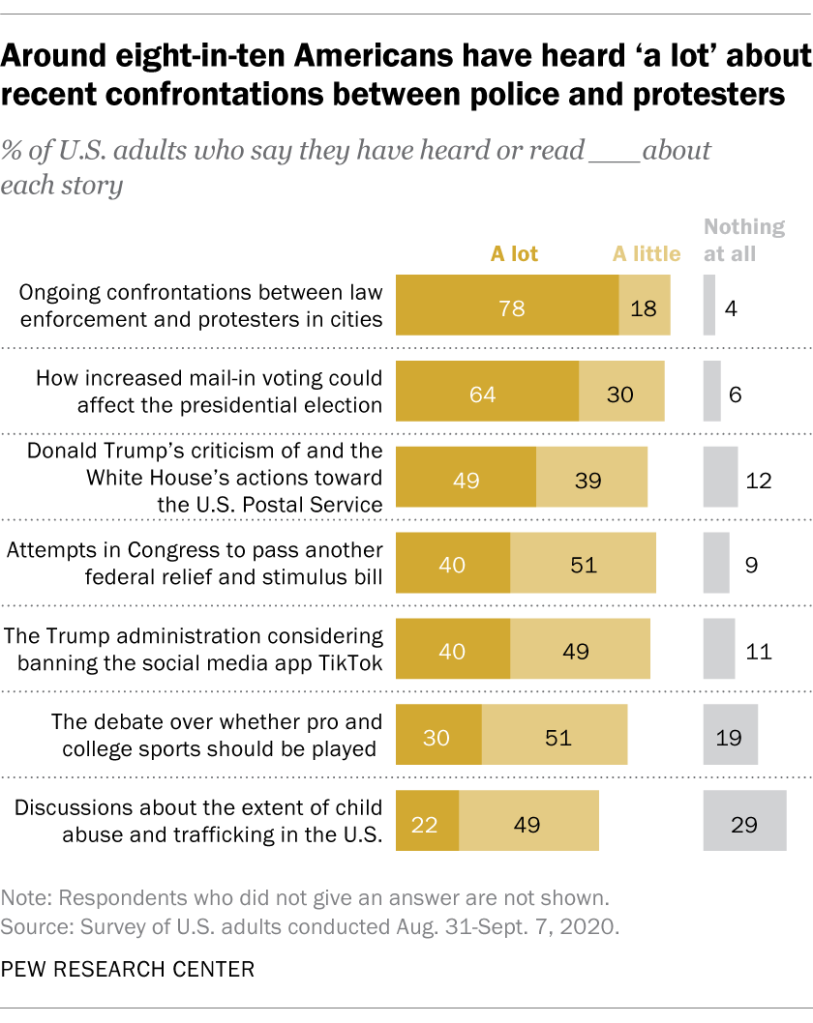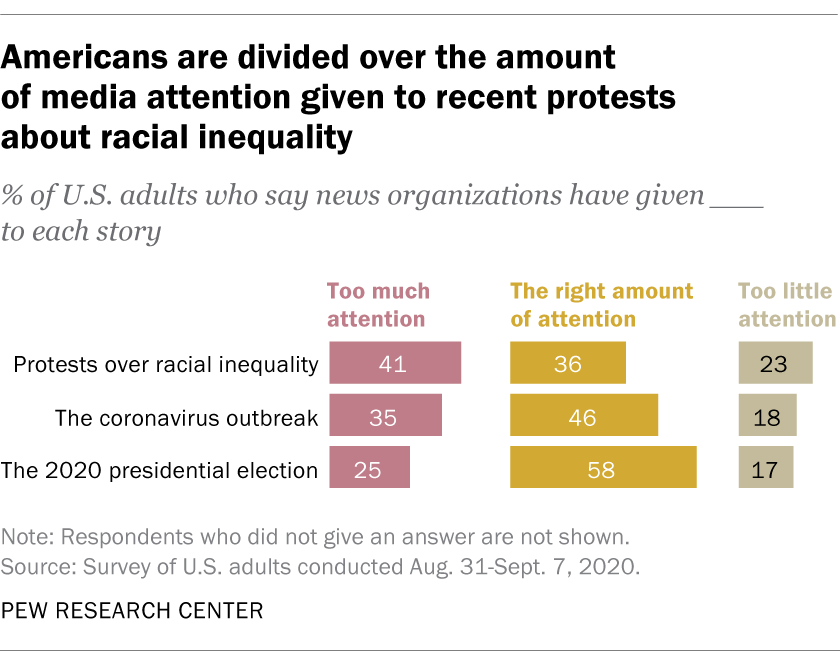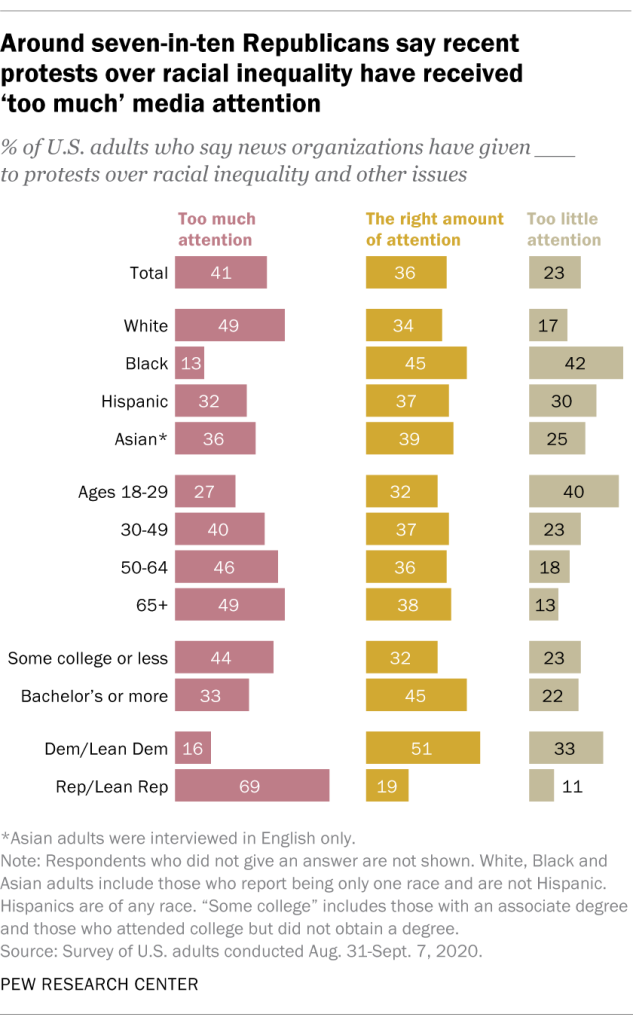
A host of major news stories have been competing for Americans’ attention in recent weeks. But the public is more likely to have heard “a lot” about ongoing confrontations between police and protesters than several other stories, according to a Pew Research Center survey conducted Aug. 31 to Sept. 7.
Around eight-in-ten U.S. adults (78%) say they have heard or read a lot about ongoing confrontations between law enforcement and protesters in cities around the country. That includes similar shares of Republicans and Republican-leaning independents (78%) and Democrats and Democratic-leaning independents (80%).
By comparison, smaller shares of adults say they have heard or read a lot about how increased mail-in voting could affect the 2020 presidential election (64%); President Donald Trump’s criticism of the U.S. Postal Service and his administration’s actions toward it (49%); attempts in Congress to pass another economic relief and stimulus bill (40%); and the Trump administration considering banning the social media app TikTok (40%). The survey of 9,220 adults was conducted as part of the Center’s American News Pathways project.
We conducted this study to learn more about the resonance of several recent news stories in the United States. The findings in this analysis are based on a survey of 9,220 U.S. adults conducted Aug. 31-Sept. 7, 2020. Everyone who took part is a member of Pew Research Center’s American Trends Panel (ATP), an online survey panel that is recruited through national, random sampling of residential addresses. This way nearly all U.S. adults have a chance of selection. The survey is weighted to be representative of the U.S. adult population by gender, race, ethnicity, partisan affiliation, education and other categories. Read more about the ATP’s methodology.
You can find most of the data from this analysis in this interactive tool. Here are the questions asked in this survey, along with responses, and its methodology.
Two other news stories asked about in the survey made less of an impression on the public. Three-in-ten Americans say they have heard or read a lot about the debate over whether professional and college sports should be played in the current environment, and only around two-in-ten (22%) say the same about discussions of the extent of child abuse and trafficking in the United States.
The survey asked separate questions about whether the public has heard about “ongoing confrontations between law enforcement and protesters in cities around the country” and the amount of attention news organizations have paid to “protests over racial inequality and other issues.” It’s important to note that many recent protests related to racial inequality have not involved confrontations with law enforcement.
While the vast majority of Americans have heard at least “a little” about recent confrontations between police and protesters in some U.S. cities – 96% of adults say this – the public is divided over whether recent protests related to racial inequality have received the right amount of attention or not.
Overall, 41% of adults say recent protests related to racial inequality have received too much attention from news organizations, while 36% say they have received the right amount and 23% say they have received too little. By comparison, larger shares of Americans say news organizations have paid the right amount of attention to two other major stories this year: the coronavirus outbreak (46%) and the presidential election (58%).
There are wide partisan differences over the amount of attention the protests have received. Around seven-in-ten Republicans (69%) say the protests have received too much attention from news organizations, while more than eight-in-ten Democrats say they have received either the right amount (51%) or too little (33%). Conservative Republicans are especially likely to say the protests have received too much attention (75% say this), while an even larger share of liberal Democrats say they have received the right amount (53%) or too little (38%).
Opinions are also divided along racial and ethnic lines. The largest share of White adults (49%) say the protests have drawn too much attention from news organizations, while around a third (34%) say they’ve gotten the right amount of attention and 17% say they’ve gotten too little. Black adults overwhelmingly say the protests have drawn either the right amount of attention (45%) or not enough (42%); just 13% believe they have received too little attention. Majorities of Hispanic and Asian Americans also say the protests have received the right amount of attention or not enough.
Older Americans are more likely to believe recent protests have gotten too much media attention; conversely, younger adults are more likely to say they’ve gotten too little. Around half of those ages 65 and older (49%) say the protests have drawn too much attention, compared with 27% of adults under 30. Those under 30, in turn, are far more likely than those 65 and older to say the protests have drawn too little attention (40% vs. 13%). There are no major age differences in the share of Americans who believe the protests have received the right amount of attention.
There are also some differences in these views by educational attainment. More than four-in-ten Americans with some college education or less (44%) say the recent protests have gotten too much attention, compared with a third of those with a bachelor’s degree or more. Those with at least a bachelor’s degree, in turn, are more likely than those with less education to say the protests have received the right amount of attention (45% vs. 32%). Both groups are about equally likely to say the protests have received too little attention.
In a separate Pew Research Center survey fielded Sept. 8 to 13, a little over half of Americans (55%) say they strongly or somewhat support the Black Lives Matter movement, which has played a key role in the recent protests over racial inequality. Support for the movement has declined by 12 percentage points since June, shortly after the death of George Floyd sparked national and international protests.
A June survey by the Center found that a majority of Americans approved of the way news organizations were covering the protests at the time.
Note: You can find most of the data from this analysis in this interactive tool. Here are the questions asked in this survey, along with responses, and its methodology.


